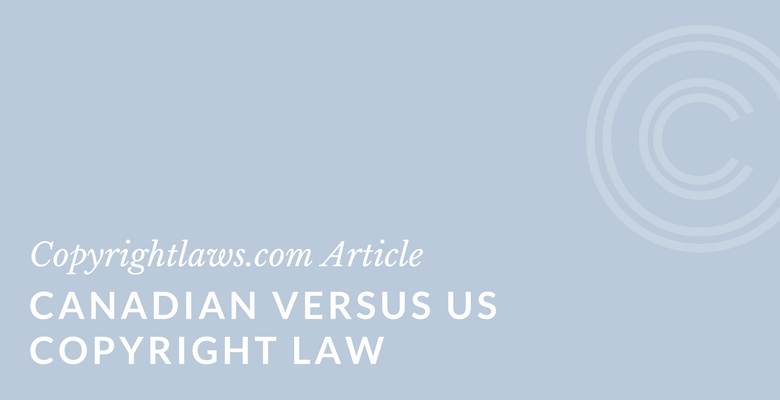
When it comes to the question "U.S. vs Canadian copyright law: which has stronger copyright protection?" the answer requires a historical examination of each country's copyright laws (legislative policy, cultural differences, court cases and copyright statutes). In this article, our comparison focuses on various sections of the U.S. and Canadian copyright acts.
Berne Copyright Convention
Both countries belong to the leading international copyright treaty, the Berne Copyright Convention. Berne currently has 181 country members. Any country whose copyright laws comply with its provisions may join. Berne has three guiding principles that each member country must comply with:
- Each member country must provide the same copyright protection to other member countries when their works are used in their country. This is called national treatment.
- National treatment applies even if a certain right doesn't exist in the work's country of origin.
- Protection must be provided without any formalities such as registration or using the international copyright symbol, ©.
For further information, see this succinct summary of the Berne Convention.
Under Berne, the U.S., Canada and all Berne member countries must include certain provisions in their respective copyright statutes relating to issues such as:
- Automatic copyright protection
- Duration of copyright
- Economic rights
- Rights of paternity and integrity of an author (moral rights)
Free uses of copyright-protected works are permitted in Berne under specified conditions (see below).
When using, reproducing and sharing copyright-protected content in the U.S. or Canada, you must apply the copyright laws of that country.
Below we highlight several provisions in the U.S. and Canadian copyright acts.
U.S. vs Canadian Copyright Law: Registration
Copyright protection is automatic in the U.S. and Canada once a work is in a fixed form. Berne requires this automatic protection in all member countries. Neither the U.S. nor Canada require registration of a work in order to obtain copyright protection. However, there are advantages for creators and content owners to register their works in their respective countries when it comes to enforcing their rights.
Generally, those who commercially exploit their works and/or those likely to enforce their rights against unauthorized users of their works register their works to benefit from the advantages of doing so in their own country.
Many Canadians also register their works with the U.S. Copyright Office because they can submit a copy of the work, which can act as evidence in a copyright infringement suit. The Canadian registration system consists of an application only. Submission or deposit of the copyright work isn't part of the application or accepted by the Canadian Copyright Office.
U.S. vs Canadian Copyright Law: Duration
In both the U.S. and Canada, the general rule of copyright duration is 70 years after the death of the author. In both countries these general rules are subject to a number of exceptions, including ones for works made in the course of employment, government works, and works of joint authorship.
Impact of the USMCA on Copyright Duration
The duration of copyright in Canada used to be life-plus-fifty. On 30 September 2018, Canada, the United States and Mexico completed negotiations on a new trade agreement, the United States-Mexico-Canada Agreement (USMCA), to replace the North American Free Trade Agreement (NAFTA). Under the USMCA, the minimum duration of copyright protection in the U.S., Canada and Mexico was set at life-plus-seventy.
Note that the government of Canada refers to the USMCA as the Canada-United States-Mexico Agreement (CUSMA). The agreement is also referred to as "the new NAFTA."
The Canadian government introduced the CUSMA implementation Act, Bill C-100, into the Canadian Parliament on 29 May 2019. The bill entered into force on 1 July 2020. Canada had two-and-a-half years from that time to implement the change in copyright duration to life-plus-seventy and in the meantime, the duration of copyright protection in Canada remained life-plus-fifty. Therefore, anything still protected by copyright as of 31 December 2022 had the duration of copyright extended for an additional 20 years.
U.S. vs Canadian Copyright Law: Protection of Government Works
In Canada copyright protects federal government works. However, U.S. federal government works don't have copyright protection in the U.S.
Under American copyright law, U.S. government works are in the public domain and may be freely used without permission. This applies to any work created by an employee of the U.S. federal government as part of that person’s official duties.
The U.S. government may, however, own copyright through assignment of copyright in works prepared by consultants and other non-employees, bequests or other transfer. For example, a consultant, freelance writer or artist may transfer or assign a work they created to the U.S. government. The government is then the copyright owner.
U.S. vs Canadian Copyright Law: Moral Rights
Moral Rights in the U.S. Copyright Act
The explicit moral rights protection that exists in the American Copyright Act (through an amendment made to it by the Visual Artists Rights Act of 1990 [VARA]) applies to only one group of creators: visual artists, or more accurately, those who create “works of visual art.”
The U.S. moral rights provision provides the following:
- The author of a work of visual art has the right to claim authorship of that work (i.e., have their name on it).
- Prevention of the use of the author's name on any work of visual art they did not create.
- The author of a work of visual art has the right to prevent the use of their name where the work is distorted, mutilated or otherwise modified in a manner that would be prejudicial to their honor or reputation.
- The author has the right to prevent any intentional or grossly negligent destruction of a work of “recognized stature.”
Also, the author of a work of visual art may not transfer their moral rights. They maintain their moral rights even if they're no longer the copyright owner of the work. However, the author may waive these moral rights by signing a written document to that effect. Moral rights last until 31 December of the year in which the author dies.
Moral Rights in the Canadian Copyright Act
In Canada, authors of all works have moral rights. This means a painting, computer software or even a corporate memorandum are subject to moral rights. When reproducing or publicly performing any work in Canada — even U.S. works — you need to respect the moral rights of the author.
In Canada, you need to include the author's name on the work, and can't make any changes that may be prejudicial to the author's honor or reputation. You're also precluded from using that work in association with a product, service, cause or institution in a manner that may harm the reputation of the creator.
Under Canadian law, an author may waive their moral rights but they can't assign or transfer them to another person except upon death. Moral rights last 70 years after the author’s death.
U.S. vs Canadian Copyright Law: Free Uses
Both Canada and the U.S. have exceptions or special provisions for libraries and archives for preservation, interlibrary loan and other specific purposes. Both countries have exceptions for educational institutions and other interest groups, and for certain specific uses. These provisions and exceptions only apply when you're using a work in that country.
Berne requires that exceptions or limitations (free uses) in its member countries are subject to the following test set out in Article 9(2) of the Convention.
It shall be a matter for legislation in the countries of the Union to permit the reproduction of such works in certain special cases, provided that such reproduction does not conflict with a normal exploitation of the work and does not unreasonably prejudice the legitimate interests of the author.
In addition, the U.S. has the fair use principle and Canada has fair dealing. Determining when either provision applies requires a judgment call based on the specific circumstances of the situation. Unlike specific exceptions for specified user groups, fair use and fair dealing potentially apply to all users of content, provided the use meets the criteria of each principle in that particular circumstance.
U.S. vs Canadian Copyright Law: Orphan Works
Orphan works are works whose owners are not identifiable or locatable. For example, historical letters or old photographs are often orphan works. Canada has a provision to obtain a license for the use of orphan works, but the U.S. has no similar provision.
What this means is that you may use an orphan work in Canada if you apply to the Copyright Board of Canada and are granted a license. However, if you're in the U.S. and can't identify or locate a copyright-protected work's copyright owner to obtain their permission, there's no mechanism in the U.S. Copyright Act to permit you to use the orphan work.
U.S. vs Canadian Copyright Law: What Do You Think?
As members of the Berne Convention, both the U.S. and Canada are obligated to provide minimum copyright protection within their own countries. However, as you can see, each country has interpreted Berne in its own manner and each has unique copyright legislation that meets its own international obligations, cultural industries and policies.
So, in the matter of U.S. vs Canadian copyright law, can you say one has stronger copyright protection than the other? As in many things copyright-related, the answer may be a matter of perspective.
Further resources you may want to consult:
For an in-depth understanding of U.S. or Canadian copyright law with an emphasis on practically applying the law to your circumstances, see the Copyright Leadership Certificate
or its sister program, the Certificate in Canadian Copyright Law.



